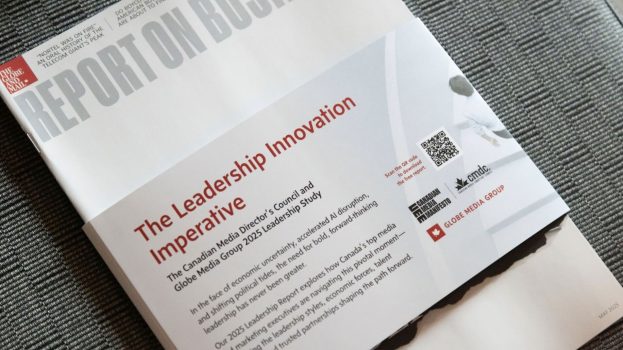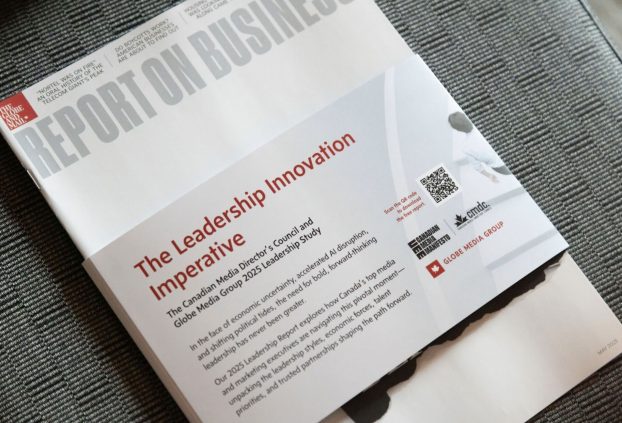He’s been called ‘passionate,’ ‘committed,’ even ‘stubborn.’ However you describe him, one thing’s for sure: When Rupert Brendon believes in an idea, he’ll go to extremes to push it through.
This characteristic has been an underlying factor in his 40-plus years in the ad business, including the last 12 during which he’s served as president/CEO of the Institute of Communications & Advertising (ICA). Alan Middleton, assistant professor, marketing at York University’s Schulich School of Business, who worked with Brendon to establish the Cassies, puts it this way: ‘When Rupert gets a bit between the teeth, he goes for it.’
Even now, with Brendon set to step down from his ICA post in December, he shows no signs of slowing down. He will continue to push for support for the brand communication program at Wilfrid Laurier’s School of Business & Economics, a curriculum he was instrumental in getting off the ground. This has meant finding a university that would offer the program, and raising $2.5 million to make it happen. To get there, Brendon created the Marketing Communications Education Trust, then visited agencies and marketing firms to ask for support. He has so far raised $1.65 million. This has taken years.
Says Brad Davis, associate professor of marketing communications and research at the School of Business & Economics: ‘It would have died in the water without Rupert. No one got it, and he persevered, and I don’t know many other people who would have stuck through that kind of nonsense.’
For Brendon the need for the program was just too great. In the U.S., business students can receive a degree in advertising, but in Canada, until now, no such luck. He and Davis recognized that the discipline of marketing was in trouble. ‘It’s getting excluded from the boardroom,’ says Davis. ‘We also want to get a group of graduates out there who think in terms of brand equity and long-term brand building,’ as opposed to cutting the marketing budget to save costs. The first graduates of the program had their convocation on June 8.
Frank Palmer, CEO/chairman, DDB Canada, one of the first agencies to contribute to the trust, says he was impressed to find out that Brendon personally donated $50,000. ‘I think it says a lot about [him].’
In explaining why he pushed so hard for the degree, Brendon, who considers it one of his proudest accomplishments, gives two reasons. The first was rational. ‘We need it, the Americans have it, the Brits have it, why can’t we have it? There’s a logic that said this must happen.’ His second explanation is more personal: ‘The thing that drives me on is a fear of failure. I hate to fail at something – I’ll go on, backing up and finding a way around, underneath or over until I get there.’
This was certainly the case when it came to the National Advertising Benevolent Society (NABS), a service he decided the industry needed back in 1983. At the time Brendon was president of Benton & Bowles (later D’Arcy Masius Benton & Bowles) and he saw a lot of similarities between the Canadian market and that of England, where the Brit started his career.
‘He was the one who really jumpstarted it,’ says Mike Fenton, president/CEO at NABS. ‘He went out and talked to a number of senior people and got them to personally endorse it. Most good causes need a champion and Rupert was the champion.’
But this too was a daunting proposition; the suggestion of NABS was originally scoffed at. ‘When you first say: ‘It’s a charity for people in advertising,’ they laugh,’ points out Middleton, who supported the idea from the beginning. ”Yeah, a whole bunch of creative people who get paid $200,000 a year, they really need a charity.’ Except Rupert and I knew there are myriads of people in the industry whose salaries are nowhere near that.
‘Rupert was passionate about this and single-handedly got it rolling.’
A decade after he pushed for NABS, Brendon had a new agenda – the creation of an awards show that celebrated results. This, of course, led to the Cassies. ‘He was instrumental in driving that forward,’ recalls Middleton, also a Cassies founder. As well as initiating the discussion that led to its development, Brendon brought forth the U.K.’s IPA (Institute of Practitioners in Advertising) Awards as a model to emulate. The goal, says Brendon, was to improve marketing’s reputation in business circles. ‘We needed – and still do – to convince skeptical clients that advertising does pay off.’
The passion and drive that fueled Brendon when it came to industry issues was also evident in his agency days.
Roy Kendall was president of Procter & Gamble, Brendon’s most important client while at Benton & Bowles. ‘He was a very capable, able man and the most dedicated and committed agency head that I ever came across,’ says Kendall.
That became crystal clear one day when Brendon invited Kendall to a cricket game, knowing that he was a fan of the sport. At the time, Brendon was having trouble getting copy for Crest approved at P&G.
‘We watched cricket for two hours and then the agenda unfolded,’ recalls Kendall. ‘He pulled out Crest storyboards and took me through them. I said, ‘Rupert these are really very good.’ He said: ‘But Roy, I can’t sell them.’
‘I didn’t want to step on my people, so I went into P&G and said: ‘What’s going on on the Crest copy front?’ And they said: ‘Not much.’ And I said: ‘Well listen, I’ve had an idea…’ and went through some stuff that Rupert had shown me. It was devious, but it worked.’
Indeed, the campaign, (endorsed by the Canadian Dental Association as being ‘tested and trusted’), found its way into the world. Says Kendall: ‘Once Rupert recognized a great idea, he would push it to the hilt. His commitment at getting a good idea through was really quite remarkable.’
Kendall was also impressed by how Brendon used to ‘eat, sleep and dream the business…. I always felt like I was the only client he ever had.’
Ed Roncarelli, who ran the agency Norman Craig & Kummel and hired Brendon in 1967, would agree with this assessment. ‘He worked very hard, understood the business, knew about the clients and knew more about their business than they did. I put him to work on Colgate-Palmolive, which at the time was NCK’s biggest client. We had it in 26 countries. He was probably one of the best account people I’ve ever known.’
Brendon passed his account management skills onto many of his underlings, like Jim McKenzie, who worked for Brendon at Leo Burnett (and later went on to become president/CEO of the shop). ‘What I learned from Rupert really helped shape my entire career, up until and including becoming CEO,’ says McKenzie, adding, ‘he really taught me what the nature of good service to a client was all about, beyond being steeped in their business. He would regularly conduct brainstorming sessions and come up with a whole laundry list of ideas over and above what they’d asked for.’
Because he had high standards, points out McKenzie, he was a tough and demanding boss. Jani Yates, EVP at the ICA, would agree. But she also calls him fair and supportive. ‘He’s never micromanaged,’ she says, pointing out that Brendon allowed her to run the Cassies independently.
But Yates knew Brendon would expect high standards. His hiring process included a psychological examination, a French test from Berlitz, even a dinner with Yates and her husband.
Brendon explains why: ‘You have to like the person, you have to respect them, and you have to get on the same wavelength. And I do believe in close friendships in business. It’s the shower time – where you come in the next day and say: ‘I was thinking about what you said yesterday and what do you think of this?’ You don’t get that if it’s just a nine-to-five job and it’s ‘I’ve done my shift, I’m going home now.”
The mutual respect between Yates and Brendon runs deep. He wholeheartedly believes she deserves to step into his position when he leaves. (The board of directors has created a selection committee to handle the hiring process.) If it happens, Yates knows he will be a hard act to follow: ‘He has doubled the ICA’s membership since he joined. He has never stopped. He is always looking at new initiatives and has brought on many best practices.
‘It [has also taken] a certain personality who is very strong in his convictions and can get people enthused and involved. The faint of heart do not take on these kinds of [roles].’
So what will Brendon do next? He will establish a new marketing consultancy, although he won’t share details yet. Perhaps he’ll also spend more time at his working farm in Huntsville, Ont. ‘I don’t intend to retire; I [want the] mental stimulation. The consultancy will be full-time, but not as pressured as what I did before.’
You really didn’t expect him to rest, did you?























